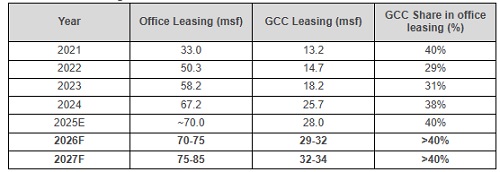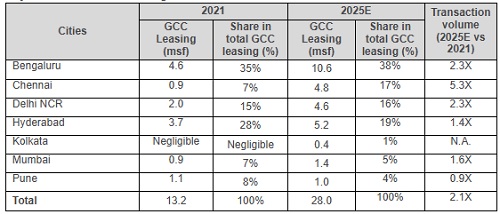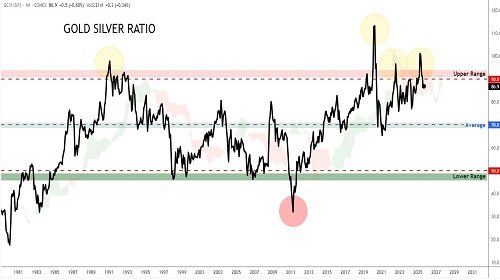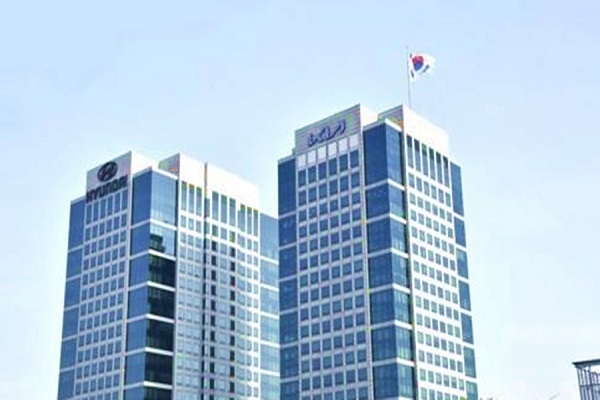Global enterprises expand, India real estate surges - GCC leasing to grow 15-20% in the next 2 years: Colliers

Since 2021, Global Capability Centers (GCCs) have leased around 100 million square feet of office space across the top seven cities in India, driving record-breaking transaction volumes across most cities. Over the past few years, GCC demand has gained strong momentum, with leasing activity by global corporates estimated to touch 28 million square feet in 2025, nearly double the levels seen in 2021. Importantly, the share of GCCs in overall office leasing, which had dipped to less than 30% in 2022, has rebounded sharply to nearly 40% in 2025. This growth trajectory is expected to sustain, with GCC leasing projected at 60–65 million square feet during 2026–2027, a 15-20% growth compared to the preceding two-year period, according to Colliers’ latest report, “GCCs in India: Building the Future of Global Enterprises,” which was released at the RICS CRE Conference in Bengaluru.
“GCCs continue to remain the cornerstone of India’s office market, powering its ongoing scale-up. Capability centers in India are steadily evolving into innovation-driven, domain-specialized, and technologically integrated centers, and are likely to drive over 40% of India’s office space demand. In the next two years alone, GCCs are likely to lease 60-65 million square feet of Grade A space across the top 7 cities, —unlocking significant real estate opportunities, fueling demand for high-quality spaces, and cementing their role as the critical growth engine of India’s office market.” says Arpit Mehrotra, Managing Director, Office Services, Colliers India.
Trends in GCC leasing

BFSI and Engineering & manufacturing to fuel GCC expansion; Leasing volumes rise 3-4X times in last few years
While the technology sector continues to lead GCC leasing with a 37% share, its demand has stabilized in recent years. Simultaneously, Technology GCCs are evolving from traditional support hubs into innovation-led centers, driving advancements in AI, data engineering, and product development for global enterprises. Interestingly, BFSI and engineering & manufacturing have expanded rapidly, with office space take-up rising 3-4X times between 2021 and 2025. In terms of contribution to overall GCC demand in India, share of BFSI has grown from 15% in 2021 to 27% in 2025, reflecting increasing footprint of global firms in the areas of risk management, compliance, digital banking, and fintech. Similarly, within GCCs, the share of engineering & manufacturing occupiers has risen from 11% to 17%, driven by growing R&D and product engineering needs. Healthcare and consulting companies have also expanded their GCC operations, further diversifying the demand base. Going forward, BFSI and engineering & manufacturing firms are together expected to account for over 40% of GCC space uptake, underscoring the ongoing demand transition from tech-led to a broad-based growth.
“GCCs will continue to anchor India’s office space demand, supporting the ongoing scale-up and diversification. While technology firms continue to drive Grade A space uptake by GCCs, the demand is becoming broader, with BFSI and engineering & manufacturing together expected to contribute 40–50% of leasing. Sustainability and flight-to-quality, meanwhile, remain central to occupier strategies, driving the preference for premium, future-ready spaces. Flex spaces too, are likely to gain traction as GCCs seek greater scalability and agility in their workplace portfolios. At the same time, Tier II cities are likely to see a steady uptick in GCC activity, supported by cost arbitrage, infrastructure development, and talent availability,” says Vimal Nadar, National Director & Head of Research, Colliers India.
Sectoral trends in GCC leasing

Bengaluru and Hyderabad drive 60% of GCC demand during 2021-2025
Bengaluru and Hyderabad have established themselves as India’s leading GCC hubs, with more than 60 million square feet of GCC leasing since 2021. Both the cities cumulatively drove more than 60% of total GCC demand during 2021-2025 period. Meanwhile, Chennai is estimated to witness 5.3X surge in GCC leasing in 2025 compared to 2021 levels, highest among all cities. Owing to affordable rentals, especially in the peripheral locations, Chennai continues to attract cost-sensitive occupiers.
Notably, Bengaluru stands out as the premier hub not only for technology GCCs but also for global engineering & manufacturing firms. Mumbai, on the other hand, is favored by front-end BFSI players, while Pune attracts leading financial institutions, particularly for support service operations. In the east, Kolkata has become a natural choice for technology and consulting GCCs seeking a presence in that region.
City-wise trends in GCC leasing


Top 10 micro-markets drive over 70% of the GCC demand during 2021-2025
Top 10 micro markets accounted for nearly three-fourths of pan-India GCC leasing since 2021. Southern cities dominate, with eight of these hubs located in Bengaluru, Hyderabad, and Chennai -supported by inherent strengths, availability of high-quality supply, robust infrastructure, and skilled future-ready talent. Bengaluru’s Outer Ring Road (ORR) and Hyderabad’s Secondary Business District (SBD) together led 37% of the country’s GCC demand since 2021, making them the most preferred corridors for MNCs and Fortune 500 firms. Other prominent hubs include Whitefield, SBD 1 and North micro market in Bengaluru, SBD and Off-SBD micro market in Hyderabad, OMR Zone 1 and MPR in Chennai, Kharadi in Pune and Malad/Goregaon in Mumbai.
US-based firms account for ~70% of GCC leasing; EMEA, UK & APAC origin firms continue expansion
US-based companies have traditionally led the GCC demand across India’s top seven cities, accounting for nearly 70% of total GCC absorption since 2021. This dominance has been fueled by strong space take-up from global technology giants and Fortune 500 firms, which have established their offshore captive business units in India. Interestingly in recent years, GCCs from the UK, EMEA, and APAC regions have also expanded their footprint, steadily strengthening their presence in India. Of the estimated 28 million sq ft of space uptake by GCCs in 2025, around 10% is likely to come from global corporates across APAC countries such as Japan, Australia, Singapore, etc. Overall, as the Indian office market continues to grow in scale and depth, an increasingly diverse mix of occupiers from across regions are expected to establish their capability centers here, further enhancing India’s prominence in the global office landscape.
Above views are of the author and not of the website kindly read disclaimer
























